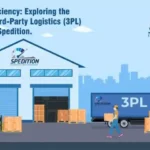Introduction: Understanding the Global Supply Chain
The global supply chain is the foundation of international trade in the contemporary interconnected globe.It includes the complex chain of producers, suppliers, manufacturers, distributors and retailers that cooperate to ship goods to customers all over the world.For Spedition, smooth cross-border operations depend on an understanding of the intricacies of the worldwide supply chain.Importance of cross-border logistics in trade is discussed in this blog, the main challenges of global logistics management are explored, as well as the strategies for efficient operations and the technology solutions for streamlining processes, regulatory compliance and successful case studies.

Importance of Cross-Border Logistics in Trade
Moving commodities across international borders is made possible in large part by cross-border logistics. It encourages cultural interchange, economic growth and access to new markets. Cross-border logistics done well for companies translates into shorter lead times, lower expenses and happier customers. Spedition achieves a competitive advantage by offering clients worldwide dependable and punctual delivery services.
Key Challenges in Global Logistics Management
Managing global logistics is no easy feat. It involves navigating a myriad of challenges, including:
- Complex Documentation and Customs Procedures: Different countries have varying documentation requirements and customs procedures, which can lead to delays and increased costs if not managed properly.
- Geopolitical Risks: Political instability, trade wars and sanctions can disrupt supply chains and impact the movement of goods.
- Currency Fluctuations: Exchange rate volatility can affect the cost of goods and shipping, making it difficult to predict expenses accurately.
- Transportation Infrastructure: Inconsistent or inadequate transportation infrastructure in some regions can hinder the efficient movement of goods.
- Regulatory Compliance: Adhering to diverse regulations and standards across countries is a constant challenge that requires meticulous planning and execution.
Strategies for Efficient Cross-Border Operations
To overcome these challenges and ensure efficient cross-border operations, Spedition employs several strategies:
- Robust Supply Chain Planning: Detailed planning and forecasting help anticipate potential disruptions and develop contingency plans.
- Collaborative Partnerships: Building strong relationships with local logistics providers, customs brokers and government agencies ensures smoother operations and quicker resolutions to issues.
- Centralized Control Towers: Establishing control towers allows for real-time shipping monitoring, visibility and proactive decision-making.
- Optimized Routing: Leveraging advanced routing algorithms and technologies minimizes transit times and costs.
- Flexible Inventory Management: Implementing flexible inventory strategies, such as just-in-time (JIT) and safety stock, helps balance supply and demand fluctuations.
Technology Solutions for Streamlining Logistics Processes
Technology plays a pivotal role in enhancing the efficiency of cross-border logistics. Spedition leverages several innovative solutions to streamline processes:
- Transportation Management Systems (TMS): TMS platforms optimize route planning, load consolidation and carrier selection, reducing costs and improving delivery times.
- Block chain Technology: Blockchain ensures transparency and security in the supply chain by providing a tamper-proof ledger for tracking shipments and verifying authenticity.
- Internet of Things (IoT): IoT devices offer real-time cargo tracking, environmental monitoring and data collection for predictive maintenance.
- Artificial Intelligence (AI) and Machine Learning (ML): AI and ML algorithms analyse vast amounts of data to forecast demand, optimize inventory and improve decision-making.
- Robotic Process Automation (RPA): RPA automates repetitive tasks such as data entry, invoice processing and customs documentation, reducing errors and increasing efficiency.
Regulatory Compliance in International Trade
Compliance with international trade regulations is paramount for successful cross-border logistics. Spedition ensures adherence to these regulations through:
- Understanding Trade Agreements: Staying informed about free trade agreements (FTAs) and regional trade agreements (RTAs) to take advantage of preferential tariffs and reduced barriers.
- Customs Compliance Programs: Implementing programs like Authorized Economic Operator (AEO) and Customs-Trade Partnership against Terrorism (C-TPAT) to streamline customs processes and enhance security.
- Accurate Classification and Valuation: Ensuring proper classification and valuation of goods to avoid penalties and delays.
- Adherence to Export Controls: Complying with export control regulations to prevent unauthorized transfer of sensitive technologies and products.
- Environmental and Safety Standards: Meeting environmental and safety standards to avoid legal issues and ensure sustainable operations.
Case Studies: Successful Cross-Border Logistics Operations
Spedition has successfully managed numerous cross-border logistics operations. Here are a few case studies that highlight their expertise:
- Automotive Industry: Spedition collaborated with an automotive manufacturer to streamline their supply chain across Europe and Asia. By optimizing transportation routes and implementing a TMS, they reduced lead times by 20% and cut transportation costs by 15%.
- Pharmaceutical Industry: For a pharmaceutical company, Spedition developed a cold chain logistics solution to ensure the safe transport of temperature-sensitive vaccines across borders. IoT devices monitored temperature and humidity in real-time, ensuring compliance with stringent regulations and maintaining product integrity.
- E-commerce Sector: Spedition supported an e-commerce giant in expanding their operations to new markets. Through the application of AI-powered demand forecast and flexible stock control, a 25% rise in consumer satisfaction resulted from less stock outs and faster delivery times.
Conclusion: Maximizing Efficiency and Compliance in Global Trade
Global businesses rely on efficient cross-border logistics to stay in business since they rely on one another.
Being able to address regulatory issues, infrastructure bottlenecks and geopolitical risks, Spedition has always been able to provide reliable services at reasonable prices. Sophisticated infrastructure application like IoT, AI, automation, and block chain makes it possible to transform business activities making them more efficient, secure and transparent. By making strategic partnerships and planning proactively, Spedition still remains the best in optimizing supply chain management which in turn sustains the global growth and customer satisfaction in diverse industries.The terrain of international trade goes on with profound modifications, Spedition is dedicated to making progress and performance as far as cross-border logistics is concerned hence continues to strengthen its position as the trusted partner in global commerce.

